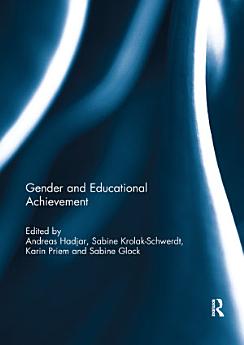Gender and Educational Achievement
Meer oor hierdie e-boek
The international contributions to this book attempt to shed light on the mechanisms behind gender inequalities and the changes made to reduce this inequality. Topics explored by the contributors include gender in science education in the UK; women’s education in Luxembourg in the 19th and 20th century; the ‘gender gap’ debates and their rhetoric in the UK and Finland; sociological perspectives on the gender-equality discourse in Finland; changing gender differences in West Germany in the 20th century; the interplay of subjective well-being and educational attainment in Switzerland; and a psychological perspective on gender identities, gender-related perceptions, students’ motivation, intelligence, personality, and the interaction between student and teacher gender. This book was originally published as a special issue of Educational Research.
Meer oor die skrywer
Andreas Hadjar is Professor in Sociology of Education at the University of Luxembourg. His research interests center on sociology of education, inequalities (class, gender, and ethnicity), political sociology (particularly participation, social values, and attitudes), well-being, methods of empirical research and international comparisons. His research and publications in regard to the issue of gender inequalities in education particularly focus on gender roles, school alienation and peer attitudes towards school.
Sabine Krolak-Schwerdt
is Professor of Educational Measurement at the University of Luxembourg. Her research topics include statistical and research methods, educational psychology, and social cognition. She is a member of the advisory board of the Journal of Educational Research Online, and an editorial consultant for journals including Psychometrika, the British Journal of Mathematical and Statistical Psychology, the Journal of Classification, and grant agencies including the German Research Foundation, Swiss National Science Foundation and European Science Foundation.Karin Priem
is Professor of History of Education at the University of Luxembourg. She has been president of the German History of Education Association (2007-2011), is a member of the international advisory board of the Revue Suisse des Sciences de l’Éducation, and is Secretary of the International Standing Conference for the History of Education. She is co-editor of two book series and her research focuses on the history of educational theories and concepts, the social, visual and material history of education, and the history of entrepreneurship and education.Sabine Glock
is a member of the School of Education at the Bergische Universität Wuppertal, Germany. She studied Psychology and holds a Ph.D. from the University of Saarland, Saarbrücken, Germany. Her research focuses on teachers’ decision making and how the ethnic background of students influences teachers’ academic achievement judgments or classroom management strategies. Her main research interest is implicit cognition, in particular implicit teacher attitudes toward ethnic minority students.



